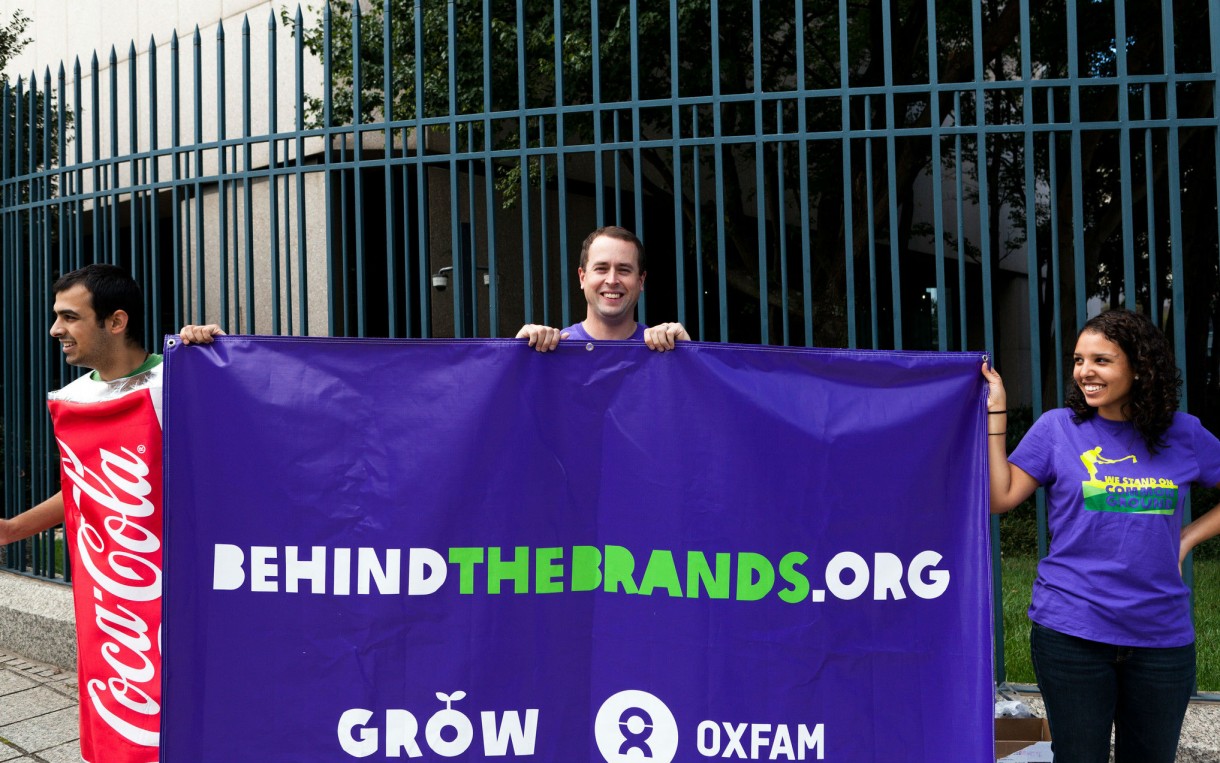Is Coca-Cola getting serious about its zero tolerance for global land grabs?
 Oxfam volunteer Khaled Hamadh (left) stands with staff members Jon Scanlon (center) and Rebecca Rewald (right) in front of Coca-Cola world headquarters during a World Food Day media event in Atlanta, Georgia last year. Photo: Keith Lane / Oxfam America
Oxfam volunteer Khaled Hamadh (left) stands with staff members Jon Scanlon (center) and Rebecca Rewald (right) in front of Coca-Cola world headquarters during a World Food Day media event in Atlanta, Georgia last year. Photo: Keith Lane / Oxfam America
Coca-Cola publishes first studies on land rights risks and impacts in its sugar cane sourcing from Guatemala and Colombia.
Chloe Christman is advisor on land rights and markets in Oxfam America’s Private Sector Department.
As the global demand for food and fuel increases, the private sector faces a major human rights challenge – land grabs. To meet the demand, the suppliers of major food and beverage companies convert the land that poor communities already own and use into large-scale plantations. And when they take it – often without consulting or compensating communities – people are left without access to the land that they’ve relied on for generations. Though major food and beverage companies do not tend to own or lease land themselves, their supply chains directly impact people’s homes, food, and incomes around the world.
As an end-user of sugar cane – one of the drivers of land grabs, Coca-Cola’s responsibility to respect human rights, per the United Nations Guiding Principles on Business and Human Rights – and its own land rights commitments – obligates it to help. As a response to Oxfam’s Behind the Brands campaign, the soft drink giant Coca-Cola committed in November 2013 to respect communities’ land rights and adopted a policy of ‘zero tolerance’ for land grabs throughout its supply chain. This week, it took a step forward putting its policy into practice.
How can Coca-Cola know if suppliers are taking communities’ land without their consent?
To begin to understand how its sugar cane sourcing affects farmers’ and communities’ land rights, Coca-Cola pledged to undertake and publish the results of third party impact assessments, or “baseline studies,” of how their supply chains impact people’s land rights. Coca-Cola will be conducting these assessments in several countries.
Here the first two assessments Coca-Cola just completed in Guatemala and Colombia.
Oxfam’s partners in Guatemala and Colombia, particularly farmer organizations, see the sugar industry as part of the problem in displacing farming communities. They see farmers facing continual challenges to their rights, including equitable access to land, and want to see bold action to change this dynamic.
There is much more for it to do to help right the wrong of historically-inequitable access to land that has fostered decades of conflict in both countries. In theory, the impact assessments should help the company figure out how to do just that.
What are the elements of an effective impact assessment?
To fulfill its purpose, any impact assessment should:
- analyze the risks posed by a company’s suppliers to communities’ land rights and how those risks materialize in a particular context,
- rely heavily on information from civil society organizations and communities, and
- evaluate whether suppliers’ land rights policies align with its own.
(Getting it Right is a community-based human rights impact assessment tool that includes many of the elements Oxfam and communities look for in such an exercise.)
But the impact assessment is just the beginning. Next steps may include working with a supplier to return land to communities a company took in the past, changing how a company acquires land in the future, and advocating to the government for strong, equitable, and well-enforced land laws.
How effective were Coca-Cola’s Guatemala and Colombia impact assessments?
Oxfam and others will be conducting in-depth analyses of Coca-Cola’s impact assessments in the coming months. But a quick look reveals that they do not tell the full story of sugar in Guatemala and Colombia – the story that Oxfam has come to understand through our partners on the ground. Coca-Cola’s sugar sourcing affects communities and poses risks to their land rights in ways that the company has yet to identify.
Still, Oxfam welcomes Coca-Cola’s willingness to begin ‘walking the walk’ on land rights. It’s not an easy path, and we want to encourage the company to stick with it and make course corrections when needed. In particular, we’re encouraged by Coca-Cola’s openness to learning how to conduct better impact assessments better: For example, in a blog post last December, Coca-Cola wrote that it brought together 25 land rights experts to provide input on its assessment process in Guatemala and Colombia. Based on experts’ feedback, Coca-Cola sent researchers back to revise the assessments. Companies can’t tackle these issues in a silo, and bringing in a range of experts to help think through complex challenges is something from which more companies could benefit. Oxfam is encouraged that Coca-Cola views these first assessments as “living documents” which will “evolve” as the company “[receives] further stakeholder comments on the improvements in the human rights due diligence process and on the substance of these due diligence reports.”
What’s next?
In addition to providing detailed comments on Coca-Cola’s first two impact assessments, Oxfam will be closely following the steps that Coca-Cola takes next in Guatemala and Colombia.
Also, Coca-Cola isn’t the only company Oxfam is watching for how it implements its commitments. Any day now, PepsiCo should be publishing the results of the third-party audit on land rights issues in its sugar cane sourcing in Brazil. Stay tuned.